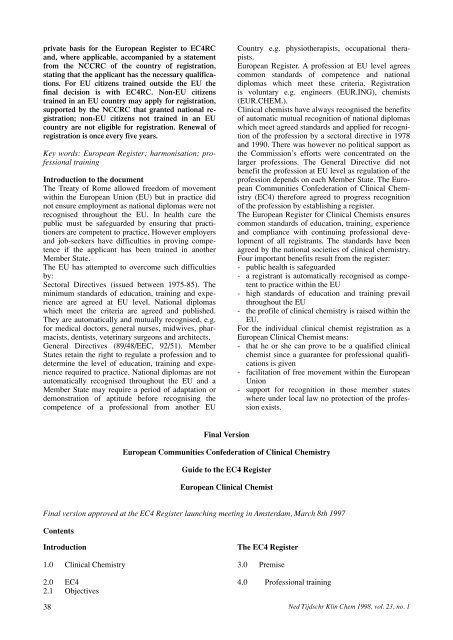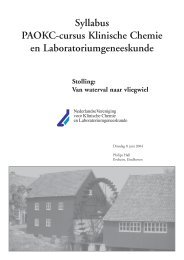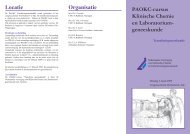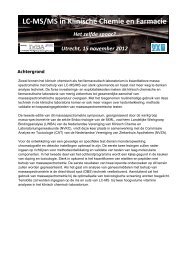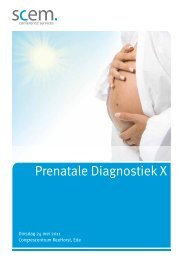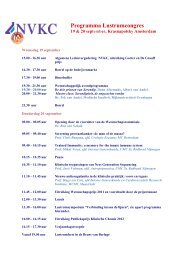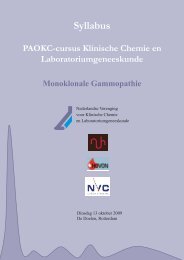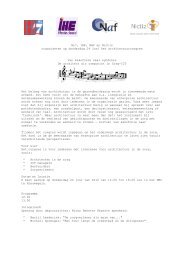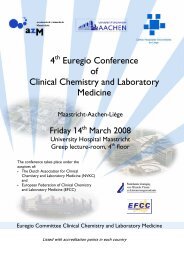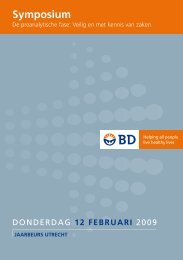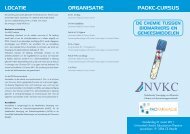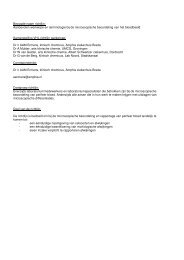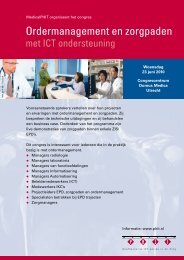Naar een Europees Register voor Klinisch Chemici - NVKC
Naar een Europees Register voor Klinisch Chemici - NVKC
Naar een Europees Register voor Klinisch Chemici - NVKC
You also want an ePaper? Increase the reach of your titles
YUMPU automatically turns print PDFs into web optimized ePapers that Google loves.
private basis for the European <strong>Register</strong> to EC4RC<br />
and, where applicable, accompanied by a statement<br />
from the NCCRC of the country of registration,<br />
stating that the applicant has the necessary qualifications.<br />
For EU citizens trained outside the EU the<br />
final decision is with EC4RC. Non-EU citizens<br />
trained in an EU country may apply for registration,<br />
supported by the NCCRC that granted national registration;<br />
non-EU citizens not trained in an EU<br />
country are not eligible for registration. Renewal of<br />
registration is once every five years.<br />
Key words: European <strong>Register</strong>; harmonisation; professional<br />
training<br />
Introduction to the document<br />
The Treaty of Rome allowed freedom of movement<br />
within the European Union (EU) but in practice did<br />
not ensure employment as national diplomas were not<br />
recognised throughout the EU. In health care the<br />
public must be safeguarded by ensuring that practitioners<br />
are competent to practice. However employers<br />
and job-seekers have difficulties in proving competence<br />
if the applicant has b<strong>een</strong> trained in another<br />
Member State.<br />
The EU has attempted to overcome such difficulties<br />
by:<br />
Sectoral Directives (issued betw<strong>een</strong> 1975-85). The<br />
minimum standards of education, training and experience<br />
are agreed at EU level. National diplomas<br />
which meet the criteria are agreed and published.<br />
They are automatically and mutually recognised, e.g.<br />
for medical doctors, general nurses, midwives, pharmacists,<br />
dentists, veterinary surgeons and architects.<br />
General Directives (89/48/EEC, 92/51). Member<br />
States retain the right to regulate a profession and to<br />
determine the level of education, training and experience<br />
required to practice. National diplomas are not<br />
automatically recognised throughout the EU and a<br />
Member State may require a period of adaptation or<br />
demonstration of aptitude before recognising the<br />
competence of a professional from another EU<br />
Introduction<br />
1.0 Clinical Chemistry<br />
2.0 EC4<br />
2.1 Objectives<br />
Final Version<br />
Country e.g. physiotherapists, occupational therapists.<br />
European <strong>Register</strong>. A profession at EU level agrees<br />
common standards of competence and national<br />
diplomas which meet these criteria. Registration<br />
is voluntary e.g. engineers (EUR.ING), chemists<br />
(EUR.CHEM.).<br />
Clinical chemists have always recognised the benefits<br />
of automatic mutual recognition of national diplomas<br />
which meet agreed standards and applied for recognition<br />
of the profession by a sectoral directive in 1978<br />
and 1990. There was however no political support as<br />
the Commission’s efforts were concentrated on the<br />
larger professions. The General Directive did not<br />
benefit the profession at EU level as regulation of the<br />
profession depends on each Member State. The European<br />
Communities Confederation of Clinical Chemistry<br />
(EC4) therefore agreed to progress recognition<br />
of the profession by establishing a register.<br />
The European <strong>Register</strong> for Clinical Chemists ensures<br />
common standards of education, training, experience<br />
and compliance with continuing professional development<br />
of all registrants. The standards have b<strong>een</strong><br />
agreed by the national societies of clinical chemistry.<br />
Four important benefits result from the register:<br />
- public health is safeguarded<br />
- a registrant is automatically recognised as competent<br />
to practice within the EU<br />
- high standards of education and training prevail<br />
throughout the EU<br />
- the profile of clinical chemistry is raised within the<br />
EU.<br />
For the individual clinical chemist registration as a<br />
European Clinical Chemist means:<br />
- that he or she can prove to be a qualified clinical<br />
chemist since a guarantee for professional qualifications<br />
is given<br />
- facilitation of free movement within the European<br />
Union<br />
- support for recognition in those member states<br />
where under local law no protection of the profession<br />
exists.<br />
European Communities Confederation of Clinical Chemistry<br />
Guide to the EC4 <strong>Register</strong><br />
European Clinical Chemist<br />
Final version approved at the EC4 <strong>Register</strong> launching meeting in Amsterdam, March 8th 1997<br />
Contents<br />
The EC4 <strong>Register</strong><br />
3.0 Premise<br />
4.0 Professional training<br />
38 Ned Tijdschr Klin Chem 1998, vol. 23, no. 1


